Chia seeds are a trending topic these days. They’re gaining so much recognition that an influencer somewhere in the world is likely sharing their recipe for chia pudding at this moment.
They are tiny and expensive, but chia seeds pack a big punch in the health and nutrition department.
Today, they have been added to the list of superfoods. So, what is it that makes chia seeds so special?
What is a Chia Seed?
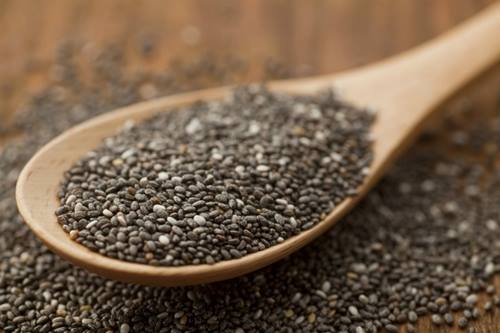
Chia comes from the Aztec word “chian,” which means oily. It describes the tiny, round seeds the ancient Mayans and Aztecs harvested from the Salvia Hispanica plant.
The plant is native to the deserts of Mexico and Guatemala. Chia seeds are full of oils and are mostly black or white, but you will sometimes see brown seeds, which are not fully grown.
Traditional use of chia seeds includes mixing in medicines, preparation of foods, and even ancient cosmetics and religious rituals.
Currently, farmers across the United States are now harvesting chia seeds and they can also be found in Australia and South America.
Chia seeds contain 138 calories per ounce (28 grams). They are six percent water, 46 percent carbohydrates, 34 percent fat, and 19 percent protein. Another pro: they are gluten-free.
They are considered a superfood because chia seeds are rich in vitamins and minerals like manganese and calcium. Chia seeds also contain powerful antioxidants, including kaempferol, quercetin, chlorogenic acid, and caffeic acid.
Here are 7 health benefits of Chia seeds
1. Improves Heart Health
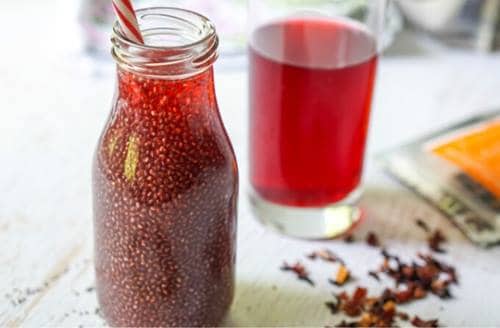
Chia seeds are full of antioxidants, including quercetin, which has been found to inhibit the oxidation of LDL or bad cholesterols as well as the reduction of inflammatory markers.
The seeds are also full of fiber and healthy fats. All of these nutrients are needed to support a healthy cardiovascular system.
Chia seeds claim the major benefit of reducing inflammation in the body and decreasing several risk factors related to heart disease.
It is especially rich in Omega-3 fatty acids which are anti-inflammatory compounds that protect the heart by lowering blood pressure, and cholesterol.
Also, the fiber in chia seeds helps to lower blood glucose levels and keeps the arteries clear to minimize the risk of coronary heart disease.
2. Good for Digestion
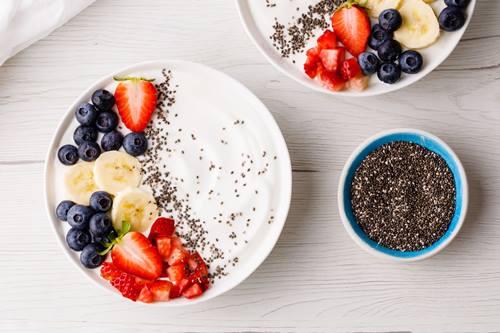
Fiber is extremely important for healthy digestion. Just one ounce of Chia contains 11 grams of soluble fiber. It assists in stool formation, grabbing fats and cholesterols and pushing them out while maintaining a regular bowel movement.
Just a small number of seeds can supply 44 percent of daily fiber requirements. And, Chia also supports gut health. The fiber in it works as a prebiotic, so the gut microbiome feeds on the fiber, thus getting the nutrients it needs to process food smoothly.
The result is the production of short-chain fatty acids which have huge benefits for the gut microbiome. This creates a positive cycle within the gut.
3. Helps Fight Cancer
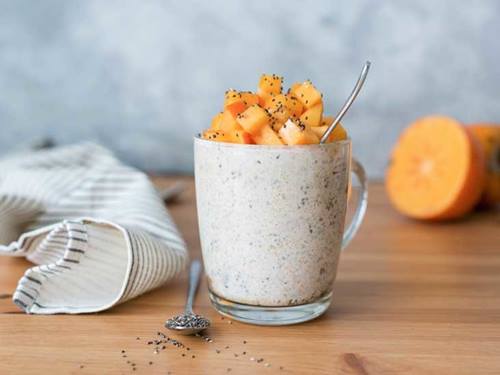
Chia seeds appear to be an effective deterrent against cancer. A 2013 invitro study published in the Journal of Molecular Biochemistry, found that the alpha-linolenic acid (ALA)found in Chia seeds helps restrict the growth of both breast and cervical cancers.
The seeds were also shown to cause the death of cancer cells without destroying other cells in the body. With such a rich source of ALAs, chia seeds decrease inflammation, which can lead to some cancers.
Also, antioxidants found in chia seeds including quercetin, chlorogenic acid, and caffeic acid are “believed to have anti-carcinogenic, antihypertensive, neuron protective effects.”
4. Regulates Blood Sugar
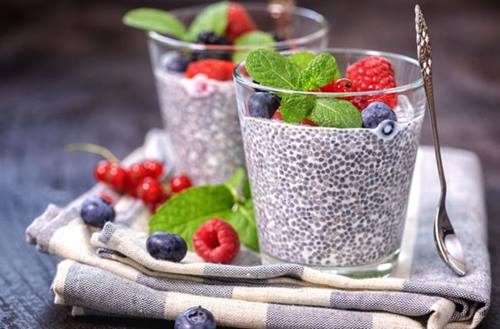
Chia seeds work well for diabetics and those suffering from blood sugar issues. Once again, the ALAs and the fiber in this superfood prove to be beneficial for blood circulation and balancing blood glucose levels.
There is evidence from several studies that suggest Chia seeds can help maintain a normal blood sugar level – essential to fighting off or avoiding diabetes as well as insulin resistance.
One animal study found that adding Chia seeds to high sugar diets prevented changes in blood sugar and lipid levels that normally follow.
Human studies have also found that adding Chia seeds to white bread reduces the glycemic response, which can prevent those crashes and spikes in blood sugar levels. That makes it a good food for diabetics who must watch their carb intake due to high sugars.
5. Boosts Energy Levels
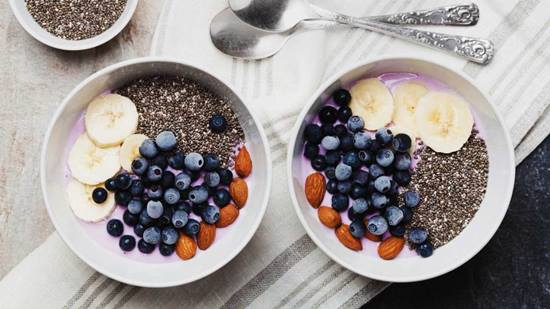
Chia seeds are being used to ‘carb load’ for athletes. A US study published in the Journal of Strength and Conditioning concluded that eating Chia seeds enhanced athletic performance similar to an energy drink.
Many runners, for example, will consume a high carbohydrate diet several days leading up to competition to increase muscle glycogen stores.
The study concluded that “Omega 3 Chia loading” was a viable alternative for enhancing performance for sporting or athletic events that last for more than 90 minutes.
In addition, it noted the Chia formula allowed athletes to reduce their intake of sugar while getting more Omega 3 fatty acids.
What this study proves is that you get an energy boost when consuming chia seeds, without consuming all the sugar.
Also, the protein in the seeds can help build muscle mass and increase strength to fuel a workout. Protein following a workout can help repair muscle to speed up recovery time.
6. Bone Regeneration
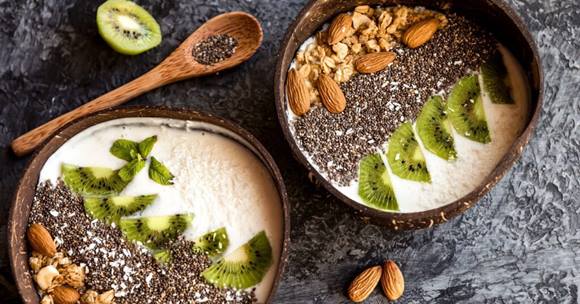
Chia seeds can strengthen bones and preserve bone density. It reduces the risk of degenerative conditions such as osteoporosis because the seeds are loaded with minerals like calcium and manganese.
These minerals are incredibly important in maintaining bone health. Aging causes bone loss as it leeches calcium from the bones in order to balance levels. To prevent this, it’s important to eat calcium-rich foods like chia seeds.
A large percentage of the body’s calcium is found in the bones, so chia seeds can play a big part in maintaining bone density and strength.
Meanwhile, Manganese is the mineral involved in bone metabolism. Studies show that manganese deficiency can impair bone reabsorption and decrease bone formation.
One ounce of chia seeds contains 18 percent of the calcium you need daily and 30 percent of your manganese daily requirements.
7. Weight Loss
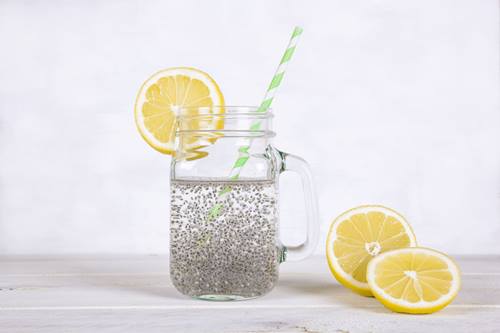
Chia seeds are low in calories. They are also high in a protein, called globulin, which helps with losing weight. In fact, chia seeds contain more protein than most cereals.
Increasing protein in the diet can help curb cravings and limit calorie consumption. When protein is high, the appetite is more manageable and you don’t need the high volumes of food to be satisfied.
A 2005 study studied the effect of high protein and low protein diets on overweight men and women. “It was concluded that the group which was fed a high protein diet lost more weight than the other group which was kept on a low protein diet.”
Chia seeds also contain 83% fiber, which helps with weight loss since increased fiber intake keeps you full. It also helps with short-chain fatty acids which help utilize carbs, so blood sugar doesn’t spike.
It’s also noted that chia seeds affect the ghrelin hormone, which reduces the hunger signal in the body. Chia seeds expand up to twice their size once consumed, forming a gel-like structure that makes the stomach feel full.
Bonus: Recent research is also proving that chia seeds can increase brain health.
How do you prepare Chia Seeds?
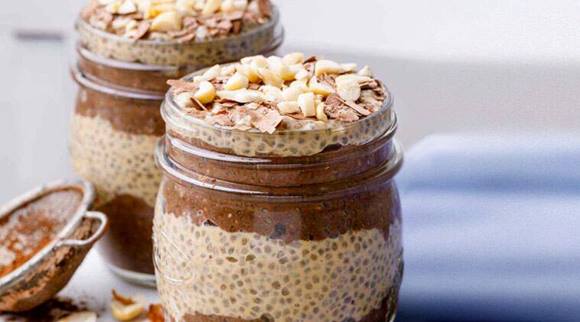
Social media is busy with users showing how you can sprinkle chia seeds on everything from Greek yogurt to strawberry smoothies. The seeds are sold in most grocery, bulk, and health food stores.
To keep them fresh, it’s best to store chia seeds in a cool, dark spot, either in the fridge or pantry. Pack them in an airtight zip bag or storage container.
Grinding chia seeds is probably the best way to get the most health benefits out of them. Chewing, alone, doesn’t break the seed down properly to absorb all the nutrients.
Otherwise, you can add chia seeds to many different foods and meals, including:
- Sprinkle over warm oats
- Mix into muffin or cookie batter
- Thicken up a smoothie
- Add seeds to your breading mix for chicken breasts
- Chia pudding – mix them with milk or fruit juice, then top with strawberries or blueberries
- Greek yogurt sprinkled with ground chia seeds or raw
Conclusion
Chia seeds have earned a reputation as a superfood for good reason. They are packed full of magical antioxidants and nutrients essential to a healthy body.
The only drawback is the amount of fiber in the seeds. Some consumers do complain of stomach aches and constipation. Such high amounts of fiber can cause diarrhea, bloating, and gas.
These problems may be curtailed with the addition of water. Drinking a few extra glasses of water should offset any issues and help the fiber pass through the digestive system.
Otherwise, there’s no reason you can’t join the cheering squad for chia seeds.
